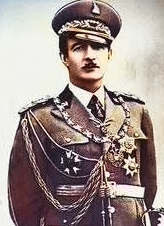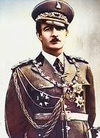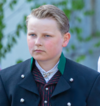Monarchy of Nova Caradia: Difference between revisions
Caradia Gov (talk | contribs) Created page with "{{Nova Caradian Monarch |photo = File:KingNicolaeIPortraitColourised.png |pronoun = His |name = '''Nicolae I Calâseș''' |date = 1690 |reign = 1690 - }} The '''monarchy of No..." |
Caradia Gov (talk | contribs) No edit summary |
||
| (3 intermediate revisions by 2 users not shown) | |||
| Line 1: | Line 1: | ||
{{Nova Caradia article}} | |||
{{Nova Caradian Monarch | {{Nova Caradian Monarch | ||
|photo = File:KingNicolaeIPortraitColourised.png | |photo = File:KingNicolaeIPortraitColourised.png | ||
|pronoun = His | |pronoun = His | ||
|name = '''Nicolae I | |name = '''Nicolae I''' | ||
|date = 1690 | |date = 1690 | ||
|reign = 1690 - | |reign = 1690 - | ||
|royalfamily = {{unbulleted list|Queen Danielu|Prince Sebastian|Prince Alecsi}} | |||
}} | }} | ||
The '''monarchy of Nova Caradia''' is the figurehead monarchy of [[Nova Caradia]]. It is derived from the same monarchical lineage as the monarchy of the [[Caradia|Caradian Duchy]], though Nova Caradia's monarchy is vitally different due to its almost nonexistent power compared to the totalitarian power exercised by the monarchy of the Duchy. | The '''monarchy of Nova Caradia''' is the figurehead monarchy of [[Nova Caradia]]. It is derived from the same monarchical lineage as the monarchy of the [[Caradia|Caradian Duchy]], though Nova Caradia's monarchy is vitally different due to its almost nonexistent power compared to the totalitarian power exercised by the monarchy of the Duchy. | ||
The monarchy was created in late 1689 in [[Mina Mițura]], the city where the royal family continues to live, with the so-called "Act de Covor Rosu" ("Red Carpet Act") granting the title to [[King-Saint Godrîc XI]], who changed his name to Nicolae I following his official coronation. The monarch resides in | The monarchy was created in late 1689 in [[Mina Mițura]], the city where the royal family continues to live, with the so-called "Act de Covor Rosu" ("Red Carpet Act") granting the title to [[King-Saint Godrîc XI]], who changed his name to Nicolae I following his official coronation. The monarch resides in Palatul de Iederă ("The Palace of Ivy"), a small palace in Mina Mițura. | ||
== Powers and Responsibility == | == Powers and Responsibility == | ||
| Line 24: | Line 26: | ||
| [[File:KingNicolaeIPortraitColourised.png|100px]] || King Nicolae I || 1690 - || [[Pândi Procescu]] || [[Milana Împotriva]] || First monarch of the Republic | | [[File:KingNicolaeIPortraitColourised.png|100px]] || King Nicolae I || 1690 - || [[Pândi Procescu]] || [[Milana Împotriva]] || First monarch of the Republic | ||
|} | |} | ||
== Biographies == | |||
=== King Nicolae I === | |||
[[File:KingNicolaeIPortraitColourised.png|left|thumb|100px|Colourised black and white photos are the traditional style for portraits of the reigning monarch]]King Nicolae Vladislav Bogdan Calâseș I was born Nicolae Sfânt vân Ignatul Neric in Sînpișul Castle near [[Relacul]] to the late Duke Alecsi XIV of [[Caradia]]. He was tutored privately in the palace in various topics, including [[Black Flame|Flemic]] theology, military strategy, the patriotic history of the Duchy, and how to use the Serfești to suppress uprisings. He then attended political and military science classes at the Royal University of Relacul for eight years. Following the death of his father by seizure, and his being declared a Saint (which had also resulted in his name being changed to Godrîc), he ascended to the throne of Caradia as King-Saint Godrîc XI. | |||
His rule over Caradia was a turbulent one. He was known to be intensely private, and is also now known to have made many of his political decisions based on the opinions of those amongst his Ducal Council, bending his own will and opinions to match those of his advisors. According to his wife, who has since changed her name from Miranda Flèchier to Danielu Flèchier Calâseș, he was far more moderate at home than in public, especially in areas where his advisors demanded the nation take an aggressive or militant policy toward other nations. During this time, he had a son, who he named Rando after his ancestor Duke Rando IV. The child's name has changed since the founding of the republic to Prince Sebastian. | |||
In 1683, the Caradian Civil War broke out, and was immediately of extremely harsh consequence to all of Caradia and Godrîc XI in particular. The capital was besieged by rebel forces, forcing Godrîc to be airlifted by military airship to the equally besieged [[Porto Vormouna]]. Godrîc attempted to keep the city held together through his presence, but the rapidly deteriorating state of both the military defenses against the rebels and the social atmosphere led to riots and violence eventually directed even at the King-Saint himself, forcing Godrîc to attempt to flee the city in his flagship Flacără Class Cruiser. This was just as he was contacted by the settlers at [[Mina Mițura]], to which he left for with his family. | |||
Following the declaration of the republic on Godrîc's suggestion, he changed his name and title to King Nicolae I, announcing that he was less sure in his Flemic faith and felt that he could not in good conscience remain a King-Saint. Since then, he has remained mostly within the royal residence of the Palatul de Iederă with his family. Queen Danielu, who has been willing to speak to the press, said that the King was distraught over the destruction of the Duchy and the presumed deaths of over two million people, including the King's brother Alecsi Droguți. Despite this, Danielu bore a second son in early 1690, who was named Prince Alecsi. | |||
King Nicolae I returned to public politics with a strong speech in front of the monarchy's under-construction new residence in [[Rorfast]], Palatul Bijuteriilor, where he expressed a desire to be closer to Nova Caradian politics and participate directly in certain regards, creating the political ideology of [[Calâseșism]]. | |||
==== Prince Sebastian ==== | |||
[[File:Prince Sebastian of Nova Caradia.png|left|thumb|100px]]Prince Sebastian Dracul Grigore Calâseș was born in Sînpișul Castle, [[Relacul]], in late 1679. His birth came close before the outbreak of the Caradian Civil War, and thus Sebastian spent most of his youth in a perilous situation constantly in fear of the discovery by rebels. Because of this, he had received no formal teaching when he arrived in the nascent republic, and he was also soon diagnosed (after treatment at the request of Queen Danielu) with multiple mental abnormalities including PTSD, which Danielu said may have originated in a particularly distressing missile strike on their residence in Porto Vormouna. Sebastian has made public the notion that he does not desire the throne of Nova Caradia, and has deferred the status of Heir Apparent to his younger brother Alecsi. | |||
Concerns have also been raised about whether Sebastian is fit to rule due to his mental impairments, trauma, and lack of education and schooling. Though he has entered into private tutoring and is receiving treatment for his conditions, some citizens believe that Sebastian should have no claim to the throne at all. | |||
Despite his handicaps, Prince Alecsi was sent to public school, eschewing private tutoring in the second half of his education in the hopes of exposing him to the opinions and beliefs of the common citizenry. | |||
==== Prince Alecsi ==== | |||
[[File:Prince Alecsi of Nova Caradia.jpg|left|thumb|100px]]Prince Alecsi Gheorghe Ion Calâseș was born in Palatul de Iederă in Mina Mițura in early 1690. Complications resulting from his birth left his mother, Queen Danielu, permanently injured and unable to bear children (an event that reportedly was the reason behind King Nicolae I choosing to spend some of the royal treasury to finance the construction of new hospitals in the republic, which indirectly aided the [[Genesis Initiative]]). He is the Heir Apparent to the Nova Caradian throne after a deferment of the status by his older brother Sebastian. | |||
[[Category:Government]] | |||
Latest revision as of 18:45, 16 December 2020
| Monarch of Nova Caradia | ||
| Coat of Arms of Nova Caradia | ||

| ||
| His Eternal, Valourous Majesty | ||
| Nicolae I | ||
| since 1690
| ||
| Style | His/Her Eternal, Valourous Majesty | |
| Residence | Palatul de Iederă | |
| Reign | 1690 - | |
| Inaugural holder | King Nicolae I | |
| Royal Family |
| |
The monarchy of Nova Caradia is the figurehead monarchy of Nova Caradia. It is derived from the same monarchical lineage as the monarchy of the Caradian Duchy, though Nova Caradia's monarchy is vitally different due to its almost nonexistent power compared to the totalitarian power exercised by the monarchy of the Duchy.
The monarchy was created in late 1689 in Mina Mițura, the city where the royal family continues to live, with the so-called "Act de Covor Rosu" ("Red Carpet Act") granting the title to King-Saint Godrîc XI, who changed his name to Nicolae I following his official coronation. The monarch resides in Palatul de Iederă ("The Palace of Ivy"), a small palace in Mina Mițura.
Powers and Responsibility
The primary responsibility of the Nova Caradian monarch is as a ceremonial head of the nation, and as a national symbol. Prior to the creation of the office, Nova Caradians, who had been thus far under the absolute rule of their monarch for their entire lives, were at best uneasy about a democratically elected government with limits placed upon its power, and at worst were violently demanding a return to absolutist rule.
The Red Carpet Act of 1689 was intended to quell these fractious movements by instating the former King-Saint of Caradia as the King of Nova Caradia. Outlined in the Constitution are the powers of the monarch, which, at first glance, appear to grant him or her absolute power over the republic, through powers granted such as the ability to issue national declarations with the full force of law, and the signature of the monarch is required for any law of the Casa Legii to pass. However, both of these powers are limited, as the declarations of the monarch have no enforceable power without the signature of the President, Prime Minister, and every member of the Casa Legii, rendering them effectively powerless, and the monarch cannot refuse to sign a bill into law which has already been voted on by the Casa Legii and signed by the President and Prime Minister. The restrictions on the monarch's power are kept from the Nova Caradian public with the intent of curtailing unrest among royalists.
List of Monarchs
| Portrait | Name | Reign | Presidents | Prime Ministers | Notes |
|---|---|---|---|---|---|
 |
King Nicolae I | 1690 - | Pândi Procescu | Milana Împotriva | First monarch of the Republic |
Biographies
King Nicolae I

King Nicolae Vladislav Bogdan Calâseș I was born Nicolae Sfânt vân Ignatul Neric in Sînpișul Castle near Relacul to the late Duke Alecsi XIV of Caradia. He was tutored privately in the palace in various topics, including Flemic theology, military strategy, the patriotic history of the Duchy, and how to use the Serfești to suppress uprisings. He then attended political and military science classes at the Royal University of Relacul for eight years. Following the death of his father by seizure, and his being declared a Saint (which had also resulted in his name being changed to Godrîc), he ascended to the throne of Caradia as King-Saint Godrîc XI.
His rule over Caradia was a turbulent one. He was known to be intensely private, and is also now known to have made many of his political decisions based on the opinions of those amongst his Ducal Council, bending his own will and opinions to match those of his advisors. According to his wife, who has since changed her name from Miranda Flèchier to Danielu Flèchier Calâseș, he was far more moderate at home than in public, especially in areas where his advisors demanded the nation take an aggressive or militant policy toward other nations. During this time, he had a son, who he named Rando after his ancestor Duke Rando IV. The child's name has changed since the founding of the republic to Prince Sebastian.
In 1683, the Caradian Civil War broke out, and was immediately of extremely harsh consequence to all of Caradia and Godrîc XI in particular. The capital was besieged by rebel forces, forcing Godrîc to be airlifted by military airship to the equally besieged Porto Vormouna. Godrîc attempted to keep the city held together through his presence, but the rapidly deteriorating state of both the military defenses against the rebels and the social atmosphere led to riots and violence eventually directed even at the King-Saint himself, forcing Godrîc to attempt to flee the city in his flagship Flacără Class Cruiser. This was just as he was contacted by the settlers at Mina Mițura, to which he left for with his family.
Following the declaration of the republic on Godrîc's suggestion, he changed his name and title to King Nicolae I, announcing that he was less sure in his Flemic faith and felt that he could not in good conscience remain a King-Saint. Since then, he has remained mostly within the royal residence of the Palatul de Iederă with his family. Queen Danielu, who has been willing to speak to the press, said that the King was distraught over the destruction of the Duchy and the presumed deaths of over two million people, including the King's brother Alecsi Droguți. Despite this, Danielu bore a second son in early 1690, who was named Prince Alecsi.
King Nicolae I returned to public politics with a strong speech in front of the monarchy's under-construction new residence in Rorfast, Palatul Bijuteriilor, where he expressed a desire to be closer to Nova Caradian politics and participate directly in certain regards, creating the political ideology of Calâseșism.
Prince Sebastian

Prince Sebastian Dracul Grigore Calâseș was born in Sînpișul Castle, Relacul, in late 1679. His birth came close before the outbreak of the Caradian Civil War, and thus Sebastian spent most of his youth in a perilous situation constantly in fear of the discovery by rebels. Because of this, he had received no formal teaching when he arrived in the nascent republic, and he was also soon diagnosed (after treatment at the request of Queen Danielu) with multiple mental abnormalities including PTSD, which Danielu said may have originated in a particularly distressing missile strike on their residence in Porto Vormouna. Sebastian has made public the notion that he does not desire the throne of Nova Caradia, and has deferred the status of Heir Apparent to his younger brother Alecsi.
Concerns have also been raised about whether Sebastian is fit to rule due to his mental impairments, trauma, and lack of education and schooling. Though he has entered into private tutoring and is receiving treatment for his conditions, some citizens believe that Sebastian should have no claim to the throne at all.
Despite his handicaps, Prince Alecsi was sent to public school, eschewing private tutoring in the second half of his education in the hopes of exposing him to the opinions and beliefs of the common citizenry.
Prince Alecsi

Prince Alecsi Gheorghe Ion Calâseș was born in Palatul de Iederă in Mina Mițura in early 1690. Complications resulting from his birth left his mother, Queen Danielu, permanently injured and unable to bear children (an event that reportedly was the reason behind King Nicolae I choosing to spend some of the royal treasury to finance the construction of new hospitals in the republic, which indirectly aided the Genesis Initiative). He is the Heir Apparent to the Nova Caradian throne after a deferment of the status by his older brother Sebastian.
